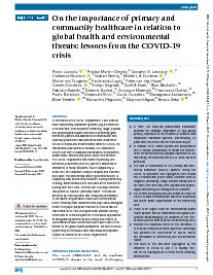On the importance of primary and community healthcare in relation to global health and environmental threats : lessons from the COVID-19 crisis
In the course of the COVID-19 pandemic, it has become clear that primary healthcare systems play a critical role in clinical care, such as patient screening, triage, physical and psychological support and also in promoting good community advice and awareness in coordination with secondary healthcare and preventive care. Because of the role of social and environmental factors in COVID-19 transmission and burden of disease, it is essential to ensure that there is adequate coordination of population-based health services and public health interventions.
The COVID-19 pandemic has shown the primary and community healthcare (P&CHC) system’s weaknesses worldwide. In many instances, P&CHC played only a minor role, the emphasis being on hospital and intensive care beds. This was compounded by political failures, in supporting local community resilience. Placing community building, social cohesion and resilience at the forefront of dealing with the COVID-19 crisis can help align solutions that provide a vision of ‘planetary health’. This can be achieved by involving local well-being and participation in the face of any pervasive health and environmental crisis, including other epidemics and large-scale ecological crises.
This paper proposes that P&CHC should take on two critical roles: first, to support local problem-solving efforts and to serve as a partner in innovative approaches to safeguarding community well-being; and second, to understand the local environment and health risks in the context of the global health perspective. We see this as an opportunity of immediate value and broad consequence beyond the control of the COVID-19 pandemic.
In: BMJ Global Health ; ISSN: 2059-7908 | 6 | 3 | maart | e004111
http://dx.doi.org/10.1136/bmjgh-2020-004111


